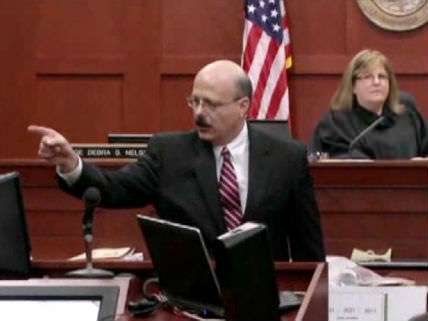Prosecutor Says George Zimmerman Is Guilty No Matter What Happened in His Fight With Trayvon Martin

"A teenager is dead," prosecutor Bernie de la Rionda declared today at the beginning of his closing argument in George Zimmerman's murder trial. "He is dead through no fault of his own. He is dead because another man made assumptions."
Of those three statements, the first is inarguably true, the third is pretty clearly true in at least some sense, and the second is the central matter of dispute in this case. If Trayvon Martin did nothing to justify Zimmerman's use of deadly force, Zimmerman is guilty of manslaughter at least. But if, as Zimmerman claims, Martin started the fight that ended in his death by knocking Zimmerman down with a punch to the face and then repeatedly smacked his head against the pavement, it is plausible that Zimmerman reasonably believed lethal force was necessary to prevent serious injury or death, whether or not Martin actually tried to grab Zimmerman's gun.
Zimmerman's guilt or innocence depends on the specific details of the fight, not the circumstances that led up to it. Yet de la Rionda urged the jury to look beyond the fight and focus on Zimmerman's assumptions about Martin's criminal propensities, which led the neighborhood watch organizer to follow the teenager and call the police to report a suspicious person. If Zimmerman had not followed Martin, de la Rionda said, Martin would still be alive. That much is true, but it does not make Zimmerman guilty of manslaughter, let alone second-degree murder. As de la Rionda conceded, everything Zimmerman did up to the moment of his violent encounter with Martin was perfectly legal. It may not have been prudent or fair, but it was legal. If Martin responded to Zimmerman's legal but unnerving actions by assaulting him, then it is not true that he is dead through no fault of his own. Even if Zimmerman was a nosy, overeager wannabe cop, as de la Rionda portrayed him, Martin's initiation of violence would not be justified. And if the fight proceeded as Zimmerman claims, his use of force was justified.
De la Rionda, by citing inconsistencies and exaggerations in Zimmerman's various statements to police, succeeded in raising reasonable doubts about the veracity of his account. But that is not enough for the prosecution to prevail—not by a long shot. The prosecution has to prove beyond a reasonable doubt that Zimmerman was not acting in self-defense when he shot Martin. To concede, as de la Rionda repeatedly did, that certain crucial details of the fight remain unclear is tantamount to conceding that the prosecution has failed to make its case. The jury is not supposed to look at disputed facts and ask which version is more likely, then convict Zimmerman based on a preponderance of the evidence. It is supposed to convict Zimmerman only if the evidence presented by the prosecution is so strong that to imagine he acted in self-defense would be highly implausible, if not utterly fanciful. The prosecution has not come close to meeting that test.
If the prosecution has not proven that the shooting was unjustified, it necessarily has not proven that Zimmerman acted based on "ill will, hatred, spite, or an evil intent," as required to convict him of second-degree murder. Its theory about his motivation is based on the idea that he took the law into his hands because he was his frustrated by the "fucking punks," the "assholes" who "always get away," as he described them in his call to police that night. But the most this "ill will" led Zimmerman to do, even according to the prosecution, was follow Martin—which, again, was not illegal. The prosecution has offered no plausible explanation for how the fight started if it did not involve a first punch thrown by Martin. In any case, Zimmerman's involvement with the neighborhhod watch and his calm cursing during the police call hardly make him a Death Wish–style vigilante. Prosecutor Richard Mantei seemed to acknowledge the inadequacy of that evidence when he argued that the act of shooting Martin in the chest by itself was enough to demonstrate "ill will."
The danger for Zimmerman is that the jurors will reject the second-degree murder charge but settle on manslaughter as a way of holding him responsible for creating the situation that led to Martin's death. Such a verdict would be psychologically understandable but legally unjustified.


Show Comments (214)